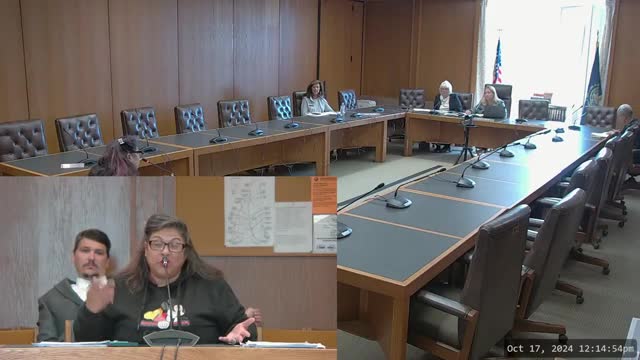Parent Advocates Address Children's Rights and Systemic Challenges in Foster Care
October 17, 2024 | Special Committee on the Family Division of the Circuit Court, House of Representatives, Committees , Legislative, New Hampshire
This article was created by AI summarizing key points discussed. AI makes mistakes, so for full details and context, please refer to the video of the full meeting. Please report any errors so we can fix them. Report an error »

In a recent meeting of the New Hampshire House Special Committee on the Division for Children, Youth and Families (DCYF), significant concerns were raised regarding the treatment of parents involved in the foster care system. The discussions highlighted the emotional and systemic challenges faced by families, particularly those with a history of substance abuse.
One parent passionately expressed gratitude for the support of fellow caregivers, emphasizing the importance of parental advocacy in the lives of children. This sentiment underscored a broader issue: the need for a supportive environment for parents who are striving to reunite with their children despite facing numerous obstacles. The speaker noted that many parents lack the resources or motivation to fight against a system that often feels overwhelming and unyielding.
A critical point of discussion was the existence of a children's bill of rights, which is intended to ensure that children in foster care maintain connections with their parents and are involved in decisions affecting their lives. However, concerns were raised about the enforcement of these rights, with parents reporting that they are frequently overlooked or ignored.
The meeting also referenced a recent report by the ACLU titled "If I Wasn't Poor, I Wouldn't Be Unfit," which highlights the disproportionate impact of socioeconomic status on parenting assessments. This report suggests that systemic biases often lead to unfair treatment of low-income families, particularly those from minority backgrounds. The implications of these findings are significant, as they call into question the fairness of the foster care system and its approach to assessing parental fitness.
Parents shared personal stories of recovery from addiction, arguing that their past struggles should not be used against them in custody decisions. They advocated for policies that recognize their progress and resilience, rather than penalizing them for historical issues. The emotional toll of navigating the foster care system was evident, with parents expressing feelings of hopelessness and frustration when faced with additional requirements, such as mandatory therapy or drug testing, despite their demonstrated commitment to recovery.
The meeting concluded with a call for accountability within the DCYF, emphasizing that the agency must adhere to the laws and policies designed to protect families. Parents expressed a willingness to fight for their rights and the rights of their children, highlighting the need for systemic change to ensure that families are treated with dignity and respect.
As the committee continues its work, the discussions from this meeting reflect a growing awareness of the challenges faced by families in the foster care system and the urgent need for reforms that prioritize the well-being of both children and parents. The path forward will require careful consideration of these issues to foster a more equitable and supportive environment for all families involved.
One parent passionately expressed gratitude for the support of fellow caregivers, emphasizing the importance of parental advocacy in the lives of children. This sentiment underscored a broader issue: the need for a supportive environment for parents who are striving to reunite with their children despite facing numerous obstacles. The speaker noted that many parents lack the resources or motivation to fight against a system that often feels overwhelming and unyielding.
A critical point of discussion was the existence of a children's bill of rights, which is intended to ensure that children in foster care maintain connections with their parents and are involved in decisions affecting their lives. However, concerns were raised about the enforcement of these rights, with parents reporting that they are frequently overlooked or ignored.
The meeting also referenced a recent report by the ACLU titled "If I Wasn't Poor, I Wouldn't Be Unfit," which highlights the disproportionate impact of socioeconomic status on parenting assessments. This report suggests that systemic biases often lead to unfair treatment of low-income families, particularly those from minority backgrounds. The implications of these findings are significant, as they call into question the fairness of the foster care system and its approach to assessing parental fitness.
Parents shared personal stories of recovery from addiction, arguing that their past struggles should not be used against them in custody decisions. They advocated for policies that recognize their progress and resilience, rather than penalizing them for historical issues. The emotional toll of navigating the foster care system was evident, with parents expressing feelings of hopelessness and frustration when faced with additional requirements, such as mandatory therapy or drug testing, despite their demonstrated commitment to recovery.
The meeting concluded with a call for accountability within the DCYF, emphasizing that the agency must adhere to the laws and policies designed to protect families. Parents expressed a willingness to fight for their rights and the rights of their children, highlighting the need for systemic change to ensure that families are treated with dignity and respect.
As the committee continues its work, the discussions from this meeting reflect a growing awareness of the challenges faced by families in the foster care system and the urgent need for reforms that prioritize the well-being of both children and parents. The path forward will require careful consideration of these issues to foster a more equitable and supportive environment for all families involved.
View full meeting
This article is based on a recent meeting—watch the full video and explore the complete transcript for deeper insights into the discussion.
View full meeting
